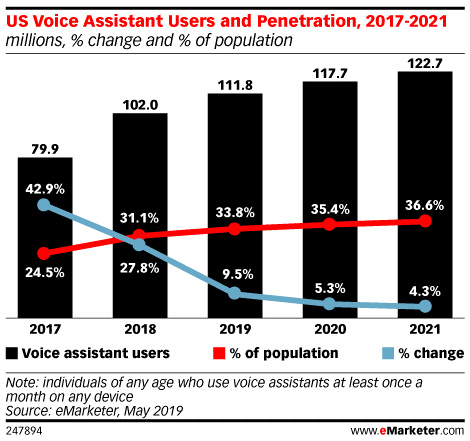Voice Search Opportunities
- 13 June -
- Home, Social Media -
- Tags :
- 0 Comments
Voice search presents a massive and often untapped opportunity for brands to add more value and gain more visibility. Here’s what you need to know about this growing trend.

Key Definitions and Facts
Voice search is a voice-enabled way to search or complete a task on the web or an app. A person speaks their query into a microphone (on their phone or a home assistant device). The queries are usually in the form of a question (such as “What is …”) or a command (“Do this …”).
Voice assistants are the programs on digital devices that facilitate the queries. Examples of voice assistants include Google Assistant and Amazon Alexa. Voice assistants can be found on many devices. For example, Google Assistant is on smartphones and a ton of other devices for the home.
Smart speakers are devices like home assistants that are powered by voice assistants. Think Google Home (powered by Google Assistant) or Amazon Echo (powered by Amazon Alexa).
Actions (Google) or Skills (Alexa) are the terms used for voice-enabled capabilities on your voice-assisted device, which are akin to apps on a smartphone. They allow the user to do something. These capabilities can be developed by Amazon itself, for example, or by third-party developers. For example, Actions on Google might help you with food delivery: “OK Google, order Chinese food.”
Voice assistants work by selecting what they believe is the best answer to a searcher’s voice query through features on the search engine results page, for example.
Or they can help a searcher facilitate a task on a voice assisted-device through a Skill or Action. In both cases, the interaction between the voice assistant and the user is conversational.
It’s also important to understand that different search engines power different voice assistants. For example, Google, of course, powers Google Assistant and all its enabled devices. But Bing powers Amazon Alexa and devices like Echo (when something is not covered by a Skill).
Key Trends and Stats
Back in 2016, Google stated that 20% of searches (one in five) on Google’s mobile app and Android devices were voice queries. Newer data from Adobe shows that 48% of consumers are using voice assistants for general web search.
eMarketer predicts that by 2021, U.S. voice assistant users will reach about 123 million, and the number is growing each year.

Amazon Alexa is a leader. It’s supported by the highest number of devices (an estimated 60,000 according to Statista), including Echo, with a rapidly growing set of Skills.

Internet Trends 2019, Bond Capital
But Google Assistant is also widely used, as outlined here.
Voice Search Benefits & Concerns
So what is the force behind the trend — why do people use voice search?
Voice search is about convenience. People say voice assistants improve their quality of life and save them time (according to Adobe data linked to earlier).
This happens whether they are using voice assistants on their smartphones (85% of the time) or in their car (31% of the time).

Adobe research via Search Engine Land
But privacy concerns could potentially hinder the adoption of voice technology. The Adobe data supports that as well as research from NPR and Microsoft.
- Eighty-one percent said their issue with voice technology was privacy concerns. (Adobe)
- Sixty-six percent say they don’t own a smart speaker because it’s always listening. (NPR)
- Forty-one percent of users reported concerns around trust, privacy and passive listening. (Microsoft)
Even with concerns about privacy, adoption is not expected to slow. Especially as the newer generations use technology on their terms.
Brands can position themselves to be more useful in a voice-search world by optimizing for voice queries.